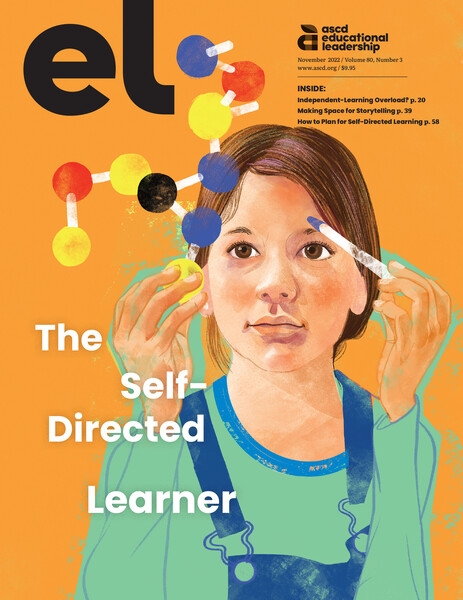November 1, 2022
•
5 min (est.)•
Vol. 80•
No. 3Why Students Make Weird Assumptions
That “wild” student comment might not be coming out of nowhere.

There are multiple ways that a would-be successful classroom conversation can morph into an absolute nightmare. Often, the culprit is a poorly thought-out prompt, asked haphazardly or in haste. Sometimes, our pacing is off—we linger too long with exchanges that should have been quick, or we rush students on from fruitful exchanges that deserve much more time.
Occasionally, the energy in the room is just off. Our students are either not as "into it" as we thought they might have been, or they are distracted by things we cannot control. Of course, we should do our best to recognize these moments for what they are and fight the urge to overreact by getting too down on either ourselves or our students. We all have "bad focus" days.
In trying to understand how potentially good conversations go bad, these "bad focus" days have taken up a lot of my attention. I find myself thinking (and sometimes directly asking students), "Where's your head right now?" This question is most obviously triggered when students seem to have their heads in the clouds or throw out random answers. But I might also ask it during a sudden altercation, which may or may not include an unexpected—and inappropriate—verbal outburst aimed at a classmate or myself. I think, What on earth would make him say that? Where is his head?
This question has rejuvenated my interest in psychology, and not just in the research on "how students learn" and "how students are motivated" that's part of our teacher training. I've become interested in what researchers have to say about why kids say wild stuff during class discussions.
This curiosity led me to a fascinating psychological study that was not just useful for my teaching practice, but also helped me develop a fun and powerful lesson and class conversation with my freshmen. The study, "You Don't Know Me, But I Know You: The Illusion of Asymmetric Insight," shows just how comfortable people are making wild assumptions about other people while at the same time believing that such assumptions don't apply to them.
In one of the study's six activities, participants were asked to fill in the blanks for a series of examples like "B A _ _" and "G O_ _" to make complete words. (So, they could, for instance, make "B A N K" or "G O A L.") After completing the series of words, participants were asked to rate the extent to which each word completion revealed something important about who they are.
The participants, reasonably, hated what this question seemed to insinuate. They insisted that their answers had been demanded by the word stimulus provided, had been cued by their thoughts at the time, or were just random. These words had nothing to say about their character. That would be ridiculous!
However, these very same participants, when shown the words that other people had written, felt very comfortable making massive assumptions about their fellow participants' character. For example, when speaking about his own answers, participant C said, "These word completions don't seem to reveal much about me … just random." When C spoke about someone else's answers, however, he said, "This person seems goal-oriented and thinks about competitive things, [according to words completed like] GOAL, SCORE, STRONG, WINNER."
Some of the participants went further and uglier, seeming to echo the wild student comments that derail class conversations. Participant E, who said that his own reconstructed words "occurred as a result of happenstance" said of another participant's words, "I think this girl is on her period. … I also think that she either feels she or someone else is in a dishonest sexual relationship, according to the words WHORE, SLOT (similar to slut), CHEAT …."
What? Where is his head? (When I show this to teachers during professional development sessions, they are especially miffed at the misplaced confidence it took to modify the benign S-L-O-T to fit this participant's "theory.")
This participant's response, along with others that were equally vacuous but less offensive, shows what some researchers have called naive realism. This term refers to, as the researchers of the study I found say, "the sense that our own perceptions and judgments are reflections of some objective reality. [Yet] when we feel that others fail to see our assessments, those others must be seeing matters in an inaccurate or biased manner." In other words, we feel like we are experts in "reading" others—and are willing to take some pretty big leaps—while at the same time believing that nobody could possibly "read" us. We are far too complex, while they are simple.
While the study I explored seems to argue that this belief is natural, it can be poisonous during tense classroom conversations. Students can easily draw expansive conclusions about their classmates' stances without truly listening to them or getting more information (while simultaneously bristling when others do the same to them). This misguided confidence leads some of them to actually share aloud strange and occasionally terrible hot takes that are similar to Participant E's.
There are a few concrete ways that teachers can use this study's findings. First, we can directly teach students about asymmetric insight—or other studies with similar findings. (Although you don't have to replicate this activity for your students to discuss its findings, my student teacher did, and it was fun! I just made a couple of modifications to ensure that students were less likely to harm each other.)
Second, after teaching kids about our human propensity to lean on asymmetric insight, it helps to deliberately preface potentially hot-button conversations by reminding students to notice when they are gleaning way too much from a tiny bit of information—and reminding them not to voice those assumptions. During conversations, try to encourage and habitually reward students who ask each other questions instead of blurting out presumptuous assertions. This can be as simple as saying, "Good question! I like how you aren't out here making assumptions!" Third, we ourselves need to remember this study when reacting to the inevitable wild student comment that has its roots in asymmetric insight.
As we work with the offending speaker (after, of course, taking care of any students who may have been harmed by the comment), it helps to chip away at whatever veneer of veracity the wild comment might have in the speaker's mind. We can best do this by showing this student that, despite what their community, their family, or even their overconfident brain says about the simplicity of "other" people, they are precisely as complex as this student is.
End Notes
•
Pronin, E., Kruger, J., Savitsky, K., & Ross, L. (2001). You don't know me, but I know you: The illusion of asymmetric insight. Journal of Personality and Social Psychology, 81(4), 639–656.
•
Gacioch, M. (2021, September 9). Asymmetric insight.






